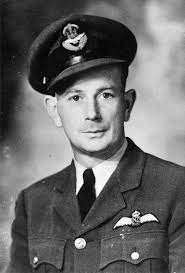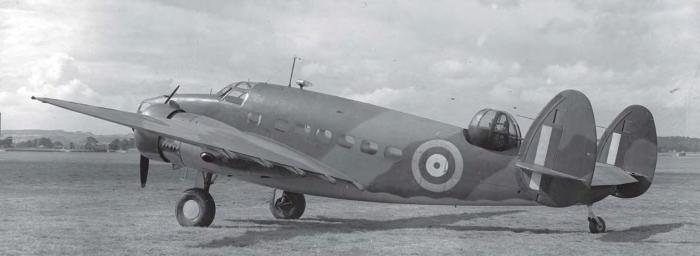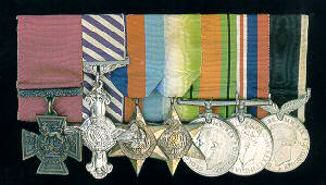Stories
Stories
Lloyd Allan Trigg, VC, DFC
Lloyd Trigg was the third New Zealand airman to receive the Victoria Cross. Unlike fellow airmen James Ward and Leonard Trent, Trigg was not a member of Bomber Command, but his story deserves to be shared. He holds a special place in history as the only serviceman to have been awarded the VC on the ‘recommendation’ of an enemy.

Lloyd Trigg VC
(Credit: Alexander Turnbull Library)
Born in Houhora, Northland in 1914, Trigg was educated at Whangarei Boys’ High School, where he served in the school cadet force before studying at Auckland University College. He then took up farming, then later becoming a machinery salesman. He also served as a non-commissioned officer in the part-time North Auckland Rifles prior to World War II.
Trigg joined the RNZAF in June 1941. After completing basic training at Levin, Trigg attended pilot training school at No. 3 EFS in Canada. He obtained his pilot’s wings on 16 January 1942, and was commissioned as a pilot officer.
Hudsons
After converting onto the Lockheed Hudson and completing further training at a reconnaissance school, Trigg was promoted to Flying Officer and embarked for the UK in October 1942, to join Coastal Command.
He was posted to West Africa in November 1942 and joined 200 Squadron RAF in January 1943. Here he took part in over 46 operational reconnaissance patrols, convoy escort flights and anti-submarine patrols and was awarded the Distinguished Flying Cross) having been involved in two attacks against U-boats in February 1943 in a Hudson.

Trigg’s early squadron service saw him flying the Lockheed Hudson with 200 Sqn. In February 1943 he was awarded a DFC for successfully depth charging a German U-boat.
U-boat Attack
The squadron later converted to the maritime version of the B-24 Liberator. His first operational flight in a Liberator was over the Atlantic from his base at Yundumn, West Africa (now Banjul, The Gambia), on 11 August 1943. After eight hours of patrol a surfaced U-boat was sighted. This was U-468 commanded by of Oberleutnant Klemens Schamong.
Trigg’s aircraft received several catastrophic hits from the submarine’s anti-aircraft guns during its approach to the vessel and was on fire as Trigg made his final attack. The aircraft then crashed, killing Trigg and his crew, so the only witnesses to his high courage were the U-boat crew members.

For Valour – by Charles Thompson
Victoria Cross
The U-boat sank, within 20 minutes but seven of the crew survived, finding a rubber dinghy that had broken loose from the Liberator. They were later discovered by a Sunderland and picked up by a Royal Navy vessel.
The German Captain reported the incident, recommending Trigg be decorated for his bravery. Interviewed after the war, Schamong said he informed interrogators after his rescue that “such a gallant fighter would have been decorated in Germany with the highest medal or order”. Trigg was the only Allied serviceman in either World War to be recommended for a Victoria Cross by the enemy.
Trigg’s citation included the following:
Flying Officer Trigg had rendered outstanding service on convoy escort and antisubmarine duties.
After searching for 8 hours a surfaced U-boat was sighted. Flying Officer Trigg immediately prepared to attack. During the approach, the aircraft received many hits from the submarine’s anti-aircraft guns and burst into flames, which quickly enveloped the tail.
The moment was critical. Flying Officer Trigg could have broken off the engagement and made a forced landing in the sea. But if he continued the attack, the aircraft would present a “no deflection” target to deadly accurate anti-aircraft fire, and every second spent in the air would increase the extent and intensity of the flames and diminish his chances of survival.
There could have been no hesitation or doubt in his mind. He maintained his course in spite of the already precarious condition of his aircraft and executed a masterly attack. Skimming over the U-boat at less than 50 feet with anti-aircraft fire entering his opened bomb doors, Flying Officer Trigg dropped his bombs on and around the U-boat where they exploded with devastating effect.
A short distance further on the Liberator dived into the sea with her gallant captain and crew.
The Battle of the Atlantic has yielded many fine stories of air attacks on underwater craft but Flying Officer Trigg’s exploit stands out as an epic of grim determination and high courage. His was the path of duty that leads to glory.
The Victoria Cross was presented to Trigg’s widow, Nola, by the Governor General of New Zealand, Sir Cyril Newall, on 28 May 1944. At his wife’s request, the presentation took place at the Trigg family home so that family and friends could be present.
It was the last Victoria Cross to be won by a New Zealander; the award being replaced by the Victoria Cross for New Zealand in 1999.

Leonard Triggs Medals, the Victoria Cross on the left
The Trigg Crew
The commendation for determination and courage surely extends to all his crew. Four of the other seven airmen killed with him were New Zealanders – Ivan Marinovich (navigator), 26, from Auckland, Arthur Bennett (wireless operator), 29, Lower Hutt, Lawrence Frost (gunner), 22, Auckland, and Terry Soper (gunner), 21, Takaka.
Marinovich and Bennett were in Trigg’s original Hudson crew and together the five hugely experienced New Zealanders collectively totalled more than 250 ops. Frost had done no fewer than 65. Two Britons and a Canadian made up the rest of the crew.
All eight are commemorated on the Malta Memorial to the air war dead.
Recalling the Attack
In 2007, New Zealand researcher Arthur Arculus tracked down Oberleutnant Schamong near Kiel. Schamong remembered the Atlantic action vividly: “We opened deadly fire from our ‘two 20mm cannons’ and the first salvo at a distance of 2000 metres set the plane on fire” Despite this, Trigg continued his attack. He did not give up as we thought and hoped. His plane … flew deeper and deeper.
We could see our deadly fire piercing through his hull and when Trigg was almost over us, we saw his ‘ash cans’ coming down on us and [they] exploded and damaged the boat to death. It was not surprising the U-boat crew expected Trigg to “give up” because on an earlier patrol the sub’s flak frightened off a Grumman Avenger from a US carrier escorting an Atlantic convoy.

A Consolidated Liberator GR.IV of Coastal Command